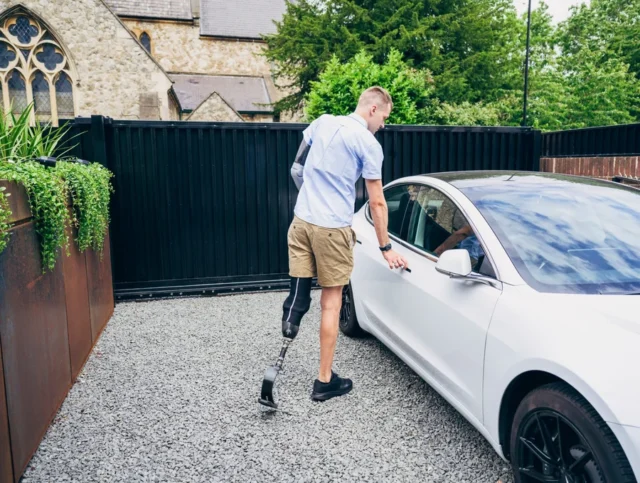Accessible Driving Training: Finding The Right Course for Disabled Drivers
We’re excited to be back on Mobility in Motion’s platform, sharing our insights for disabled drivers. For many, driving provides an important sense of independence. With the right support and training, many disabled people can continue or learn to drive safely and confidently. In this article, we’ll be exploring accessible driving training and how they can help you to learn to drive or regain driving confidence following a change in your physical ability.
Why Accessible Driving Training Matters
Acquiring or adjusting to a disability may change your driving experience, and getting back on the road can be challenging. Accessible driving training is essential to ensure drivers are confident in operating an adapted vehicle, with tailored lessons designed to meet individual needs. Whether you’re handling an adapted vehicle for the first time, or you’ve taken a break from driving, the right course can make all the difference.
Can I Continue To Drive If I Have A Disability?
In most cases, yes, you can still drive with a disability, but certain medical conditions may need to be reported to the DVLA (or the DVA in Northern Ireland). The DVLA/DVA assesses whether the condition will affect your ability to drive and may recommend adaptations, regular assessments or place restrictions on your licence for safety.
If you’re unsure whether your condition affects your ability to drive, consult your doctor or contact the DVLA for further advice. Common adaptations and controls may enable you to continue driving safely.
How Can I Learn To Drive With A Disability?
Learning to drive as a disabled individual often involves lessons in specially adapted vehicles that suit your specific needs. This could involve hand controls, pedal adaptations, or specialist steering aids. Many driving schools and instructors now cater specifically to disabled drivers, ensuring that their training accommodates various needs.
A disability driving assessment is often the first step. A qualified assessor will recommend the right type of vehicle and adaptations for you. This will be followed by lessons with a specialist instructor who can help you learn to drive or regain confidence in handling an adapted vehicle.
Popular driving aids could include:
- Hand controls which transfer the function of acceleration and braking from foot to hand.
- Pedal modifications which can transfer the acceleration from the right foot to the left foot, or pedal extensions which bring your pedals closer to you.
- Steering wheel adaptations that offer the safe one-handed operation of the steering wheel, often an accompaniment for hand control drivers.
Is The Driving Test Different For Disabled Drivers?
The main components of the driving test remain the same regardless of whether you have a disability. However, your adapted vehicle will be used for the practical test, and the examiner will account for any modifications made to suit your needs. It’s important to notify the DVLA that you’ll be taking the test in an adapted vehicle so they can make appropriate arrangements.
In some cases, a driver may have restrictions placed on their licence, meaning they can only drive specific types of vehicles with certain adaptations, or perhaps only with an automatic gearbox. You’ll be informed of any conditions or restrictions after completing your driving test.
Can I Keep My Licence After Becoming Disabled?
If you acquire a disability while holding a valid driving licence, you must report your condition to the DVLA/DVA. They will assess whether it’s safe for you to continue driving and may place conditions on your licence to reflect your new driving requirements. Some conditions, like epilepsy or severe vision impairment, may result in your licence being suspended until your symptoms are managed. Always consult the DVLA for specific advice regarding your condition. View our blog to explain the different driving licence codes.
Finding The Right Disability Driving Course
Whether you’re a new driver or returning after a break, finding the right accessible driving training course for your needs is key. Here’s some popular options across the UK.
Driving Mobility Centres: The UK has a network of Driving Mobility Centres that provide assessments, advice and training for disabled drivers. These centres often offer professional driving tuition in adapted vehicles and can advise on the types of controls or modifications required. If your disability has affected your confidence, these organisations can help build your driving skills and address concerns about returning to the road. Search for a Driving Mobility Centre near you.
Specialist Driving Schools: For those who need training specifically tailored to adapted vehicles, there are several specialist driving schools across the UK. These schools focus on providing instruction using a range of adapted vehicles, ensuring you’re prepared to handle any new equipment.
Funding Your Driving
Driving lessons in adapted vehicles may be more expensive than standard lessons, but there are some funding options available which could help to cover the cost:
- Motability Scheme: If you receive a qualifying Mobility Allowance, you may be eligible for a grant covering up to 40 hours of driving lessons through the Motability Scheme.
- Family Fund: This charity provides the Driving Ambitions grant, aimed at helping young disabled individuals with no driving experience with the cost of learning to drive.
- Turn2Us: For carers or disabled people, Turn2Us offers a platform to search for applicable grants and financial support.
We’d like to extend another thank you to Mobility in Motion for having us share this guide. If you’re looking for more information on adapted vehicles, visit Mobility in Motion’s adaptations page. For more disability motoring news and advice, be sure to explore MotaClarity for all the latest updates.
Please note: The organisations listed are not exhaustive and serve as an overview to demonstrate the range of assistance available across the UK.

Accessible travel
The Best Cars Currently Available On The Motability Scheme
The Motability Scheme is fantastic for disabled people, providing them with the opportunity to lease a brand-new car using their qualifying Mobility Allowance. With so many…

Accessible travel
The Future of Electric WAVs: Overcoming Challenges & Embracing Accessibility
Discover the challenges of Electric Wheelchair Accessible Vehicles (eWAVs) and how our innovative adaptations are paving the way for accessible EVs today. Explore our insights into…

Driving with adaptations
Cost-Effective and Reliable Driving Aids for Amputees: Our Recommendations
Life after limb loss and amputation doesn’t have to mean the end of driving. Although it can affect your mobility and driving ability, there are a…